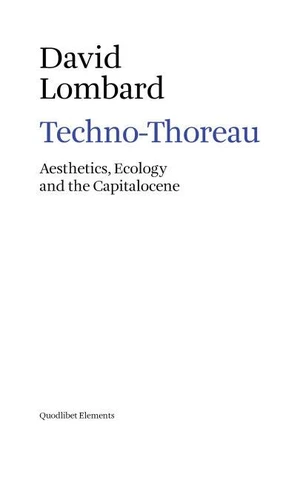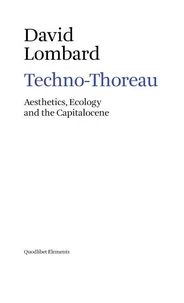Techno-Thoreau. Aesthetics, Ecology and the Capitalocene
Par :Formats :
Disponible dans votre compte client Decitre ou Furet du Nord dès validation de votre commande. Le format ePub est :
- Compatible avec une lecture sur My Vivlio (smartphone, tablette, ordinateur)
- Compatible avec une lecture sur liseuses Vivlio
- Pour les liseuses autres que Vivlio, vous devez utiliser le logiciel Adobe Digital Edition. Non compatible avec la lecture sur les liseuses Kindle, Remarkable et Sony
 , qui est-ce ?
, qui est-ce ?Notre partenaire de plateforme de lecture numérique où vous retrouverez l'ensemble de vos ebooks gratuitement
Pour en savoir plus sur nos ebooks, consultez notre aide en ligne ici
- FormatePub
- ISBN978-88-229-1075-2
- EAN9788822910752
- Date de parution09/03/2020
- Protection num.Digital Watermarking
- Taille202 Ko
- Infos supplémentairesepub
- ÉditeurQuodlibet
Résumé
EN. This essay serves the double purpose of investigating the aesthetic dimensions of Thoreau's environmental philosophy while examining the philosophical and political implications of its capacity to break down the boundaries between the natural and the technological landscape. Deeply rooted in an Emersonian transcendentalist tradition viewing nature as an organized and holistic "whole, " Thoreau's ecophilosophy seeks to reconcile the idealistic pole with the empirical pole in its approach to natural and technological landscapes, objects and situations.
Consequently, this book starts by considering Thoreau as a "techno-author" who does not shun from embracing technological change in the Romantic period and proceeds to develop an alternative, proto-ecocritical form of the aesthetic of the sublime. It also calls for a reconsideration of Thoreau's poetics and its legacy against the background of the "toxic sublime, " which sheds a new light on the methods and purposes of ecocriticism as well as on recent trends in environmental (non)fiction. IT.
Questo saggio si propone il duplice scopo di studiare la dimensione estetica della filosofia ambientale di Thoreau e di analizzare le implicazioni filosofico-politiche della sua capacità di abbattere i confini tra paesaggio naturale e paesaggio tecnologico. Profondamente radicata nella tradizione trascendentalista di Emerson, che vede lo spazio naturale come un "tutto" organizzato e olistico, l'eco-filosofia di Thoreau cerca di riconciliare - con il suo approccio ai paesaggi naturali e tecnologici, agli oggetti e alle situazioni - il polo idealistico e il polo empirico.
Pertanto, questo libro inizia prendendo in considerazione Thoreau come "tecno-autore", che non si rifiuta di accettare i cambiamenti tecnologici verificatisi nel periodo romantico, ma sviluppa una forma alternativa e proto-ecocritica dell'estetica del sublime. L'autore cerca anche di riesaminare la poetica di Thoreau e la sua eredità sullo sfondo del "sublime tossico", gettando così nuova luce sui metodi e sulle finalità dell'ecocritica, nonché sulle recenti tendenze della (non)fiction ambientalista.
Consequently, this book starts by considering Thoreau as a "techno-author" who does not shun from embracing technological change in the Romantic period and proceeds to develop an alternative, proto-ecocritical form of the aesthetic of the sublime. It also calls for a reconsideration of Thoreau's poetics and its legacy against the background of the "toxic sublime, " which sheds a new light on the methods and purposes of ecocriticism as well as on recent trends in environmental (non)fiction. IT.
Questo saggio si propone il duplice scopo di studiare la dimensione estetica della filosofia ambientale di Thoreau e di analizzare le implicazioni filosofico-politiche della sua capacità di abbattere i confini tra paesaggio naturale e paesaggio tecnologico. Profondamente radicata nella tradizione trascendentalista di Emerson, che vede lo spazio naturale come un "tutto" organizzato e olistico, l'eco-filosofia di Thoreau cerca di riconciliare - con il suo approccio ai paesaggi naturali e tecnologici, agli oggetti e alle situazioni - il polo idealistico e il polo empirico.
Pertanto, questo libro inizia prendendo in considerazione Thoreau come "tecno-autore", che non si rifiuta di accettare i cambiamenti tecnologici verificatisi nel periodo romantico, ma sviluppa una forma alternativa e proto-ecocritica dell'estetica del sublime. L'autore cerca anche di riesaminare la poetica di Thoreau e la sua eredità sullo sfondo del "sublime tossico", gettando così nuova luce sui metodi e sulle finalità dell'ecocritica, nonché sulle recenti tendenze della (non)fiction ambientalista.
EN. This essay serves the double purpose of investigating the aesthetic dimensions of Thoreau's environmental philosophy while examining the philosophical and political implications of its capacity to break down the boundaries between the natural and the technological landscape. Deeply rooted in an Emersonian transcendentalist tradition viewing nature as an organized and holistic "whole, " Thoreau's ecophilosophy seeks to reconcile the idealistic pole with the empirical pole in its approach to natural and technological landscapes, objects and situations.
Consequently, this book starts by considering Thoreau as a "techno-author" who does not shun from embracing technological change in the Romantic period and proceeds to develop an alternative, proto-ecocritical form of the aesthetic of the sublime. It also calls for a reconsideration of Thoreau's poetics and its legacy against the background of the "toxic sublime, " which sheds a new light on the methods and purposes of ecocriticism as well as on recent trends in environmental (non)fiction. IT.
Questo saggio si propone il duplice scopo di studiare la dimensione estetica della filosofia ambientale di Thoreau e di analizzare le implicazioni filosofico-politiche della sua capacità di abbattere i confini tra paesaggio naturale e paesaggio tecnologico. Profondamente radicata nella tradizione trascendentalista di Emerson, che vede lo spazio naturale come un "tutto" organizzato e olistico, l'eco-filosofia di Thoreau cerca di riconciliare - con il suo approccio ai paesaggi naturali e tecnologici, agli oggetti e alle situazioni - il polo idealistico e il polo empirico.
Pertanto, questo libro inizia prendendo in considerazione Thoreau come "tecno-autore", che non si rifiuta di accettare i cambiamenti tecnologici verificatisi nel periodo romantico, ma sviluppa una forma alternativa e proto-ecocritica dell'estetica del sublime. L'autore cerca anche di riesaminare la poetica di Thoreau e la sua eredità sullo sfondo del "sublime tossico", gettando così nuova luce sui metodi e sulle finalità dell'ecocritica, nonché sulle recenti tendenze della (non)fiction ambientalista.
Consequently, this book starts by considering Thoreau as a "techno-author" who does not shun from embracing technological change in the Romantic period and proceeds to develop an alternative, proto-ecocritical form of the aesthetic of the sublime. It also calls for a reconsideration of Thoreau's poetics and its legacy against the background of the "toxic sublime, " which sheds a new light on the methods and purposes of ecocriticism as well as on recent trends in environmental (non)fiction. IT.
Questo saggio si propone il duplice scopo di studiare la dimensione estetica della filosofia ambientale di Thoreau e di analizzare le implicazioni filosofico-politiche della sua capacità di abbattere i confini tra paesaggio naturale e paesaggio tecnologico. Profondamente radicata nella tradizione trascendentalista di Emerson, che vede lo spazio naturale come un "tutto" organizzato e olistico, l'eco-filosofia di Thoreau cerca di riconciliare - con il suo approccio ai paesaggi naturali e tecnologici, agli oggetti e alle situazioni - il polo idealistico e il polo empirico.
Pertanto, questo libro inizia prendendo in considerazione Thoreau come "tecno-autore", che non si rifiuta di accettare i cambiamenti tecnologici verificatisi nel periodo romantico, ma sviluppa una forma alternativa e proto-ecocritica dell'estetica del sublime. L'autore cerca anche di riesaminare la poetica di Thoreau e la sua eredità sullo sfondo del "sublime tossico", gettando così nuova luce sui metodi e sulle finalità dell'ecocritica, nonché sulle recenti tendenze della (non)fiction ambientalista.




